Last Lecture
 Staff
·
20 minute read
Staff
·
20 minute read
The Last Lecture
Each semester, Dr. Derek Cabrera does a “last lecture” to close out the year for his students. This year, due to Coronavirus, his lecture was virtual, however the silver lining of this is that we got it on tape.
Dr. Derek Cabrera
Here's the video:
Transcript and slides below:
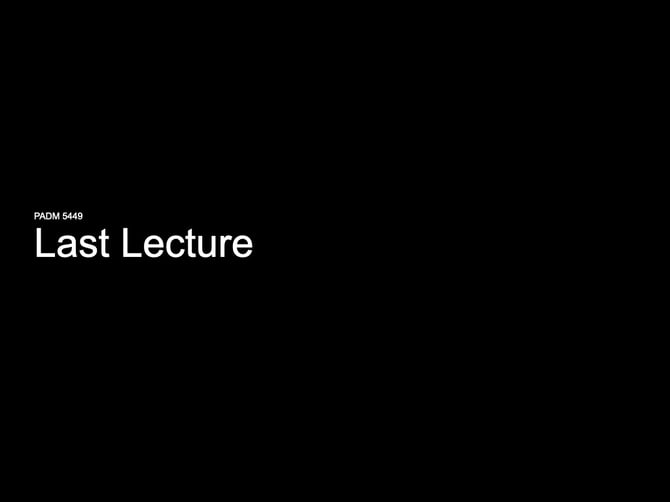
We’ve all been socially distancing—separate from each other in so many ways, yet also together as one, sharing a common stressful, disorienting experience. This experience—I think for all of us—has been one that is equal parts: terrifying as we see the infection rates, and death rates, and threatening economic and even social collapse, not to mention the vacuum of leadership on so many fronts but also, it has been strangely peaceful, as for many of us who are serve “non-essential” roles, the hustle-bustle of our everyday lives has temporarily abated. Some have taken up drawing, we binge-watch TV series we’ve seen before, and even find time for a little introspection.
So I want to share my own experience in quarantine. As a systems scientist and faculty at Cornell I teach the next generation of graduate students systems thinking, systems mapping, and systems leadership. This course, specifically, is on the latter. And, I’m always looking for new examples that will help students to apply these ideas. As I watch the news and experience the terrifying peacefulness that is our current norm, I have to say that there couldn’t be a more in-your-face, real-world, wicked problem that screams for the things we teach you all.
What possible alternative scenario, other than COVID-19, could make a better case for the immense importance of the basic Systems Thinking Loop? The idea that we must conform our mental models to reality rather than conform reality to our mental models. We see these errors of confirmation bias—conforming reality to our mental models—everyday playing out in our leadership and the results are deadly real.
And, What possible alternative scenario, other than COVID-19, could make a better case for the immense importance of Complex Adaptive Systems or CAS? The idea that a system’s behavior (say, the number of infections and deaths) is an emergent property of the simple rules (social distancing, testing, contact tracing, hand washing, etc) followed locally by autonomous agents. And boy can they be autonomous!
I ask you, what possible alternative scenario, other than COVID-19, could make a better case for the immense importance of understanding human organization, and human organizations, as a Flock rather than a Clock? Organizations are not clinical, mechanical clockworks that full of hierarchically controlled people that do everything they’re told to do. They are self-organizing, organic, unruly, beasts with a mind of their own that grow and evolve. Organizations behave more like living things than like machines. And, they are everywhere. Not just the formal corporations and bureaucracies but the informal organization that is often even more important. The spontaneous, self-organization that sends tens of thousands of masks—one at a time—to New York in a time of crisis. That is organization, too.
And finally, I ask you this: What possible alternative scenario, other than COVID-19, could make a better case for the immense importance of systems leadership? Leadership that takes these important ideas into account. Leadership that sees the big picture and the tiniest details. Leadership that works with the four most basic functions of all organizations: Vision, Mission, Capacity, and Learning.
So it is that in this period of terrifying peacefulness, when we have time to question what really matters, what I have found is a renewed love and respect for the work of Systems Thinking and Systems Leadership. It turns out—I admit somewhat surprisingly so—that it is even more important than I thought; and I thought it was pretty important to begin with. ;-)
Crisis has a clarifying effect and I have gained new clarity in this crisis.
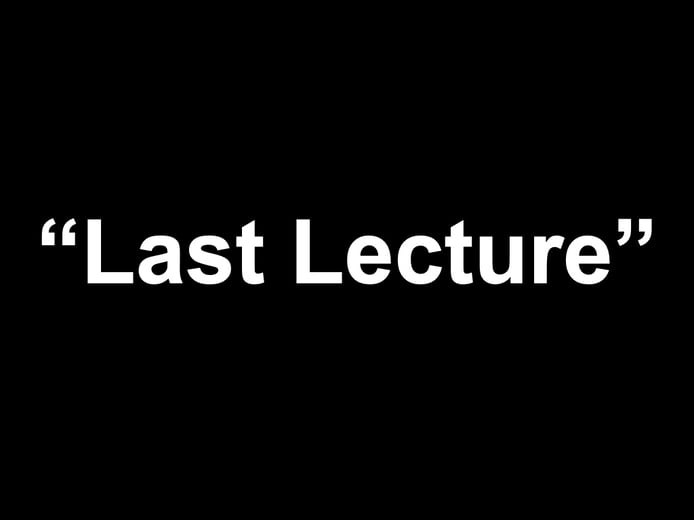
I call this the “last lecture” not because I think it will be my last, but today may be, for some of you, the last time I get the privilege of influencing your mind. So, I want to share a few last thoughts before you go on your way.
Some of these thoughts may be new to you and some you may have heard before; even heard them from me before. But, I assure you that all of them are ideas that will need to be heard many many times before you understand their significance. Trust me, I ignored them the first dozen or so times.
I’d like to end our semester together the same way we started it: with why?. Why? Because nature seems to come full circle and so will I.
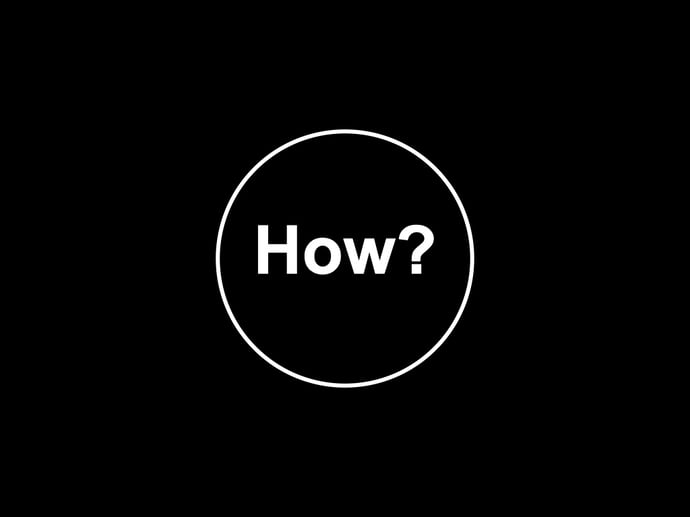
In this course, we spent most of the semester learning about how to do things systematically [in organizations].
- We learned that all organizations—from cells to corporations— have four universal functions.
- We learned that thinking drives learning, which drives capacity, which drives mission, which drives vision.
- We learned that leadership is the art and science of changing things and that management is the art and science of maintaining things.
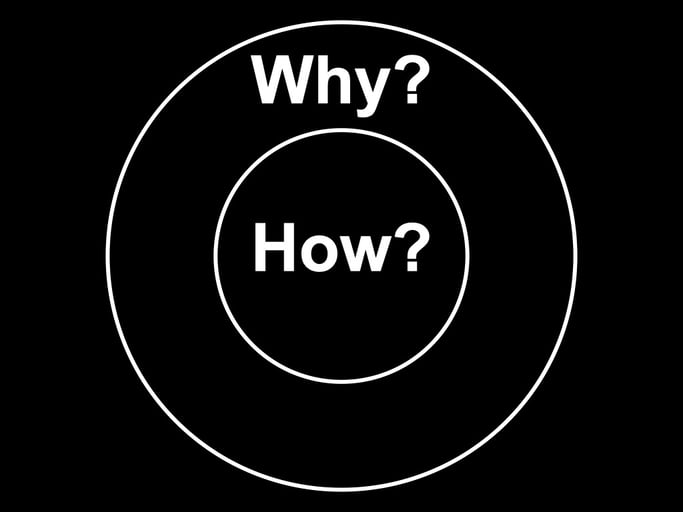
But we started the semester considering the why? So, I want to revisit the why?
- Why must we approach problems differently?
- Why must we make decisions differently?
And especially,
- Why must we ORGANIZE, differently?
- Why must we think differently?
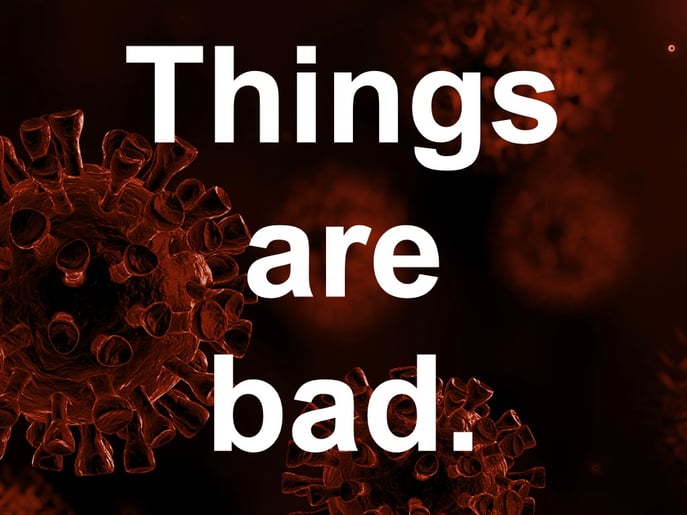
Because, things are bad. Seriously. They are really, really bad. And, by the way, I gave this lecture before COVID-19. So when I say things are bad, I really mean they are the worst. And, that’s not just my opinion. It's a fact, borne of the numbers.
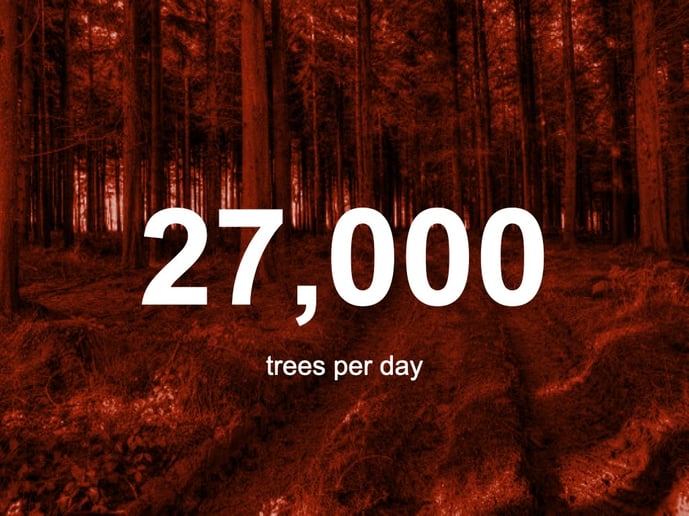
27,000 trees per day are cut down just for our toilet paper consumption[1] (that’s just for toilet paper, it doesn’t include other paper and wood products).
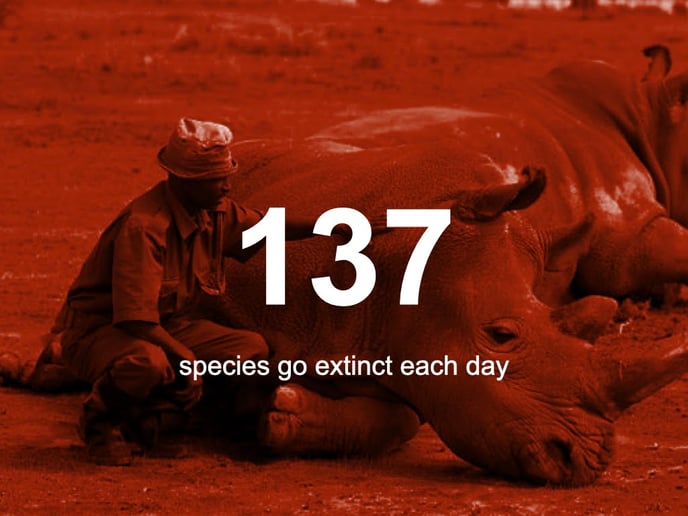
That’s the number of species, on average, that go extinct per day.[2] That 50,000 species per year!
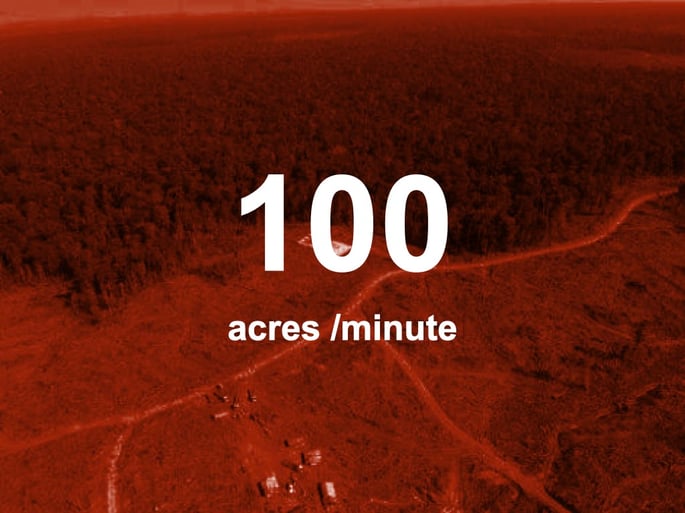
The rainforests are being cut down at a rate of 100 acres per minute.[3]
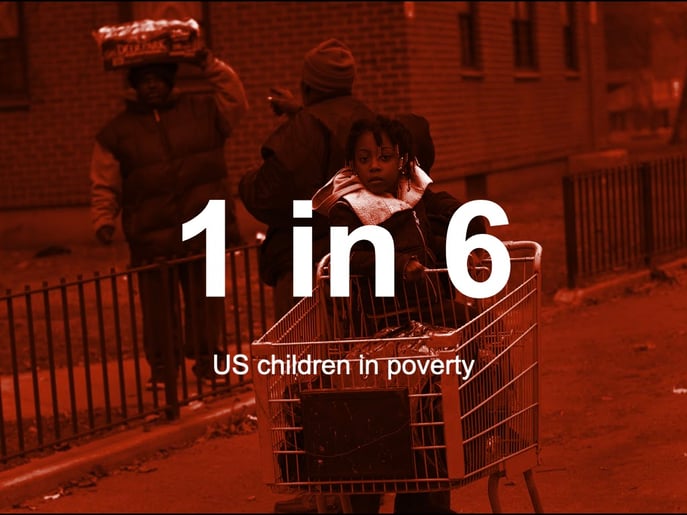
1 in 6 children in in United States of America, live in poverty. That’s 11.9 million children or 16.[4]
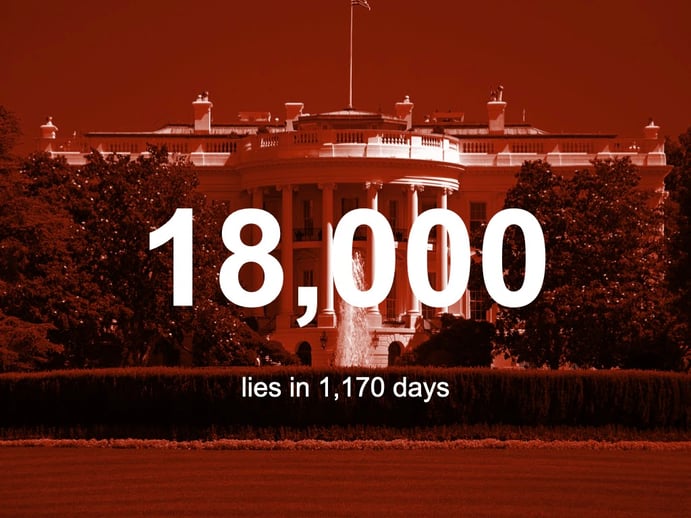
All presidents lie in order to pander to a diverse political base. But, our current President has taken lying to unprecedented levels. Arguably the most powerful person in the human race has lied 18,000 times in 1,170 days.[5] That’s an average of 15.38 lies per day! What’s worse, it appears that he is using these lies, not to better our national interests, but to serve his own. In the process he has discredited and threatened the foundations of the world’s greatest democracy.
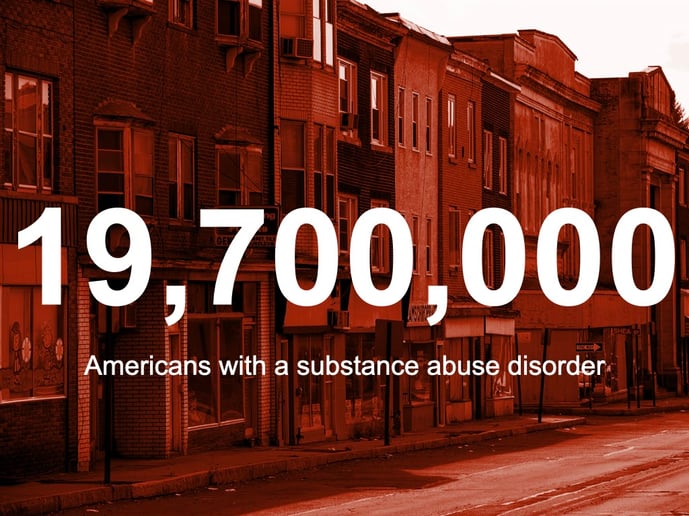
There are 19,700,000 Americans with a substance abuse disorder.[6] That’s 16% of the country. That’s 1 in 6 people.
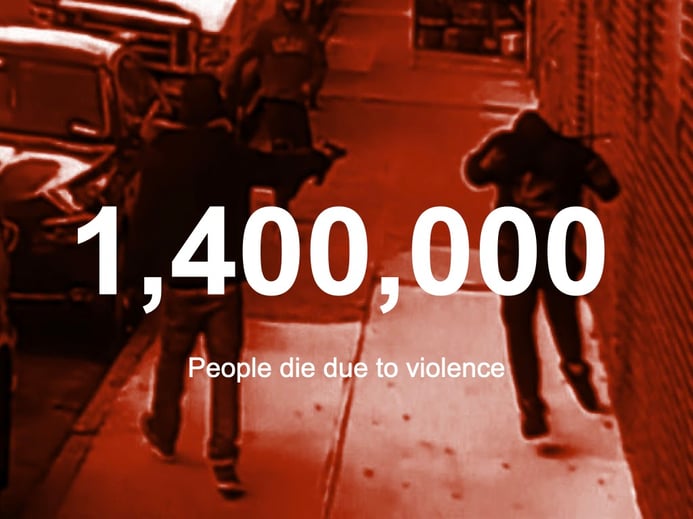
Each year, 1.4 Million people worldwide die to violence.[7]
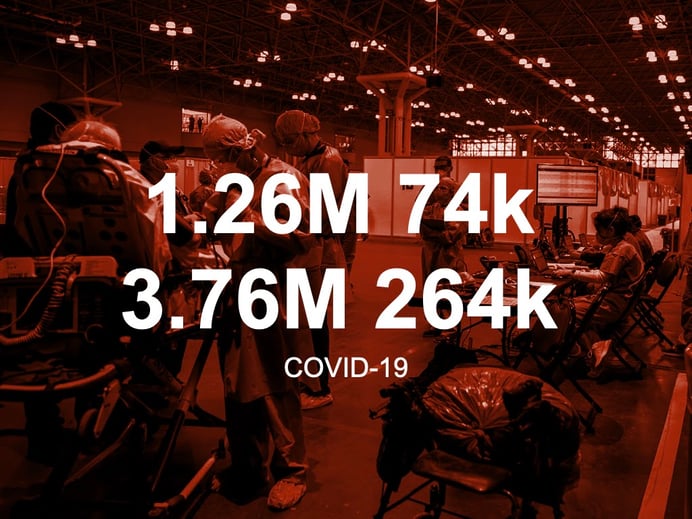
As of today, the United States had 1.26M confirmed cases of COVID-19 and 74,581 deaths. Which was 33% and 28% of the 3.76M cases and 264k deaths Worldwide.
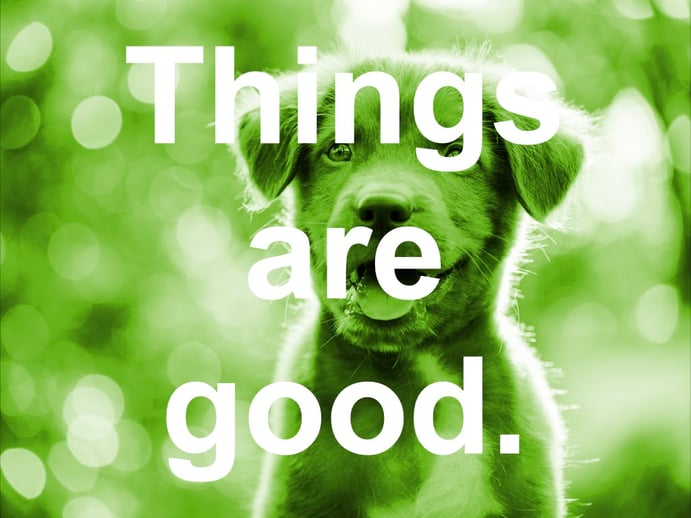
Things are good. Not all things are good. In fact, quantitatively, things are actually pretty good.
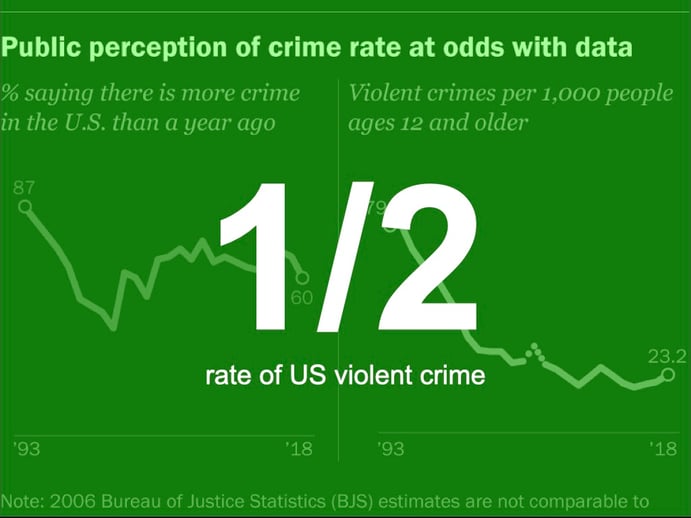
The rate of violent crime has been cut in half in the last decade.[8]
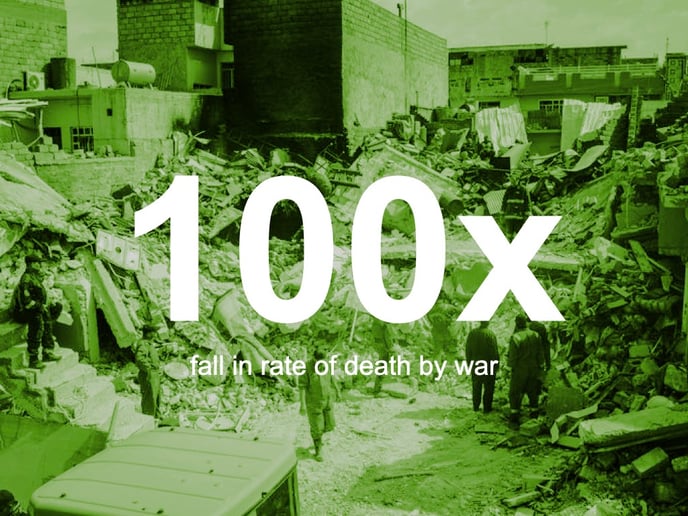
The rate of death by war fell 100x in the last 25 years.[9]
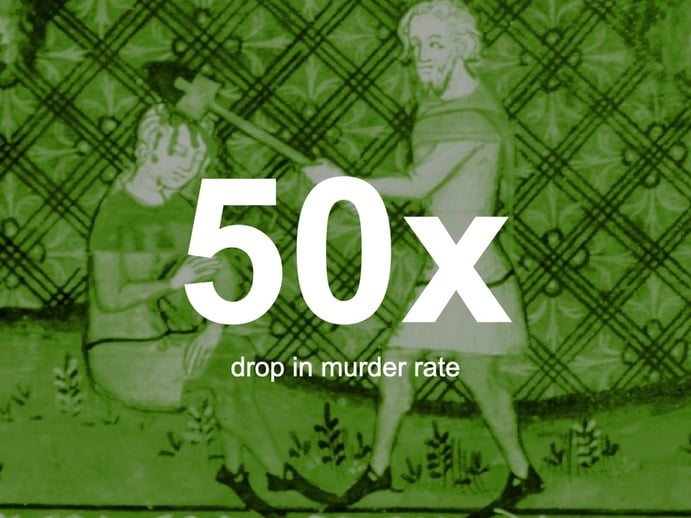
There has been a 50-fold drop in murder rate in Europe between Middle ages and 20th century.[10]
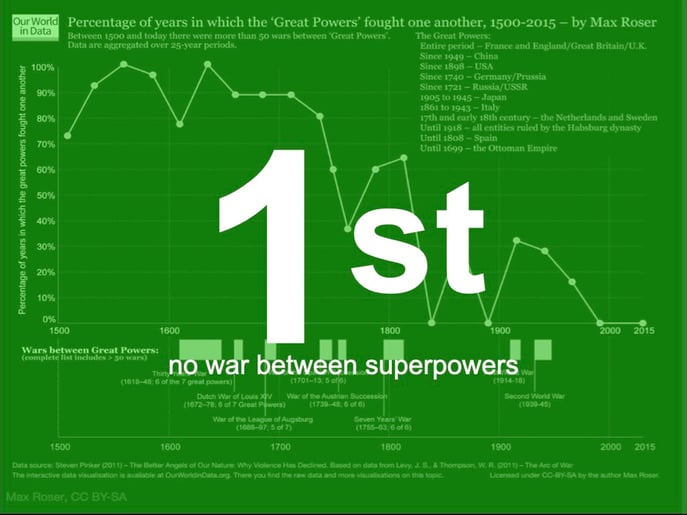
This is the first time in human history (since WW2) in which warring among super powers has stopped.[11]
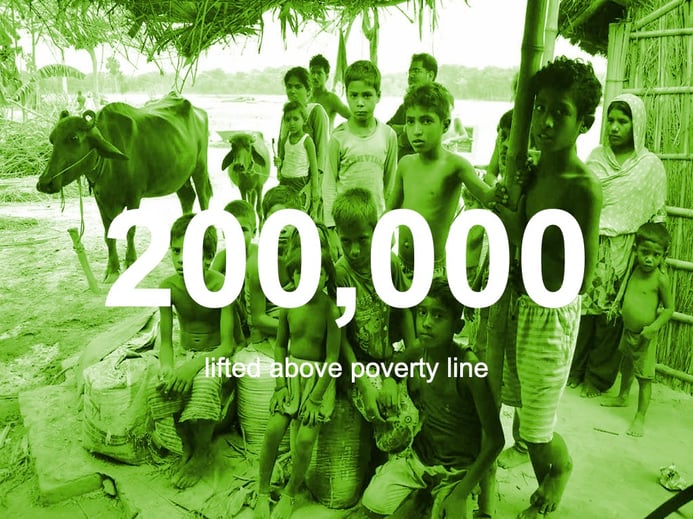
Globally 200,000 people are lifted above $2/day poverty line, everyday.[12]
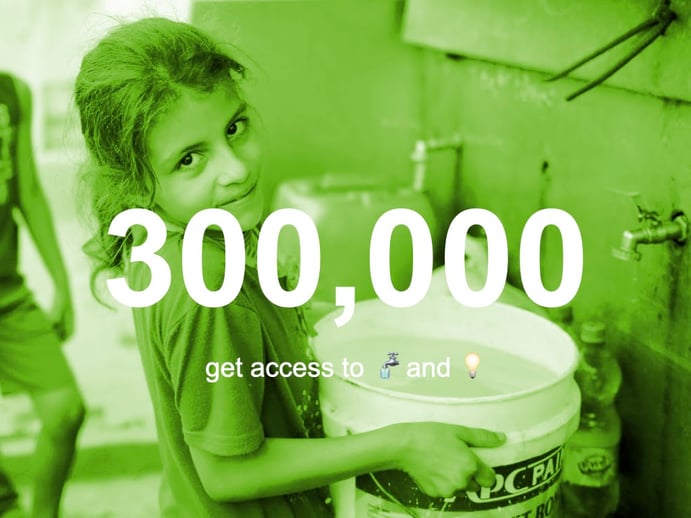
300,000 people get access to electricity/clean water, everyday.[13]

And, there are many trends in the data that show that things are looking up (or down as it were).
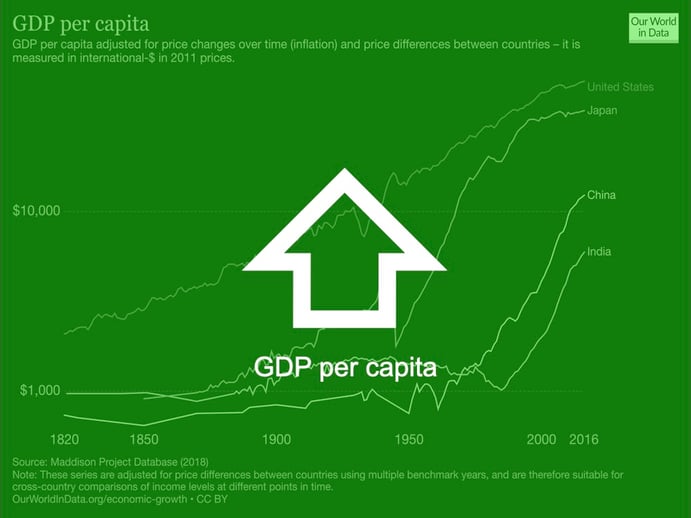
GDP per capita is trending upward. Life expectancy is trending upward. The number of citizens living under democratic political regimes is increasing.[14]
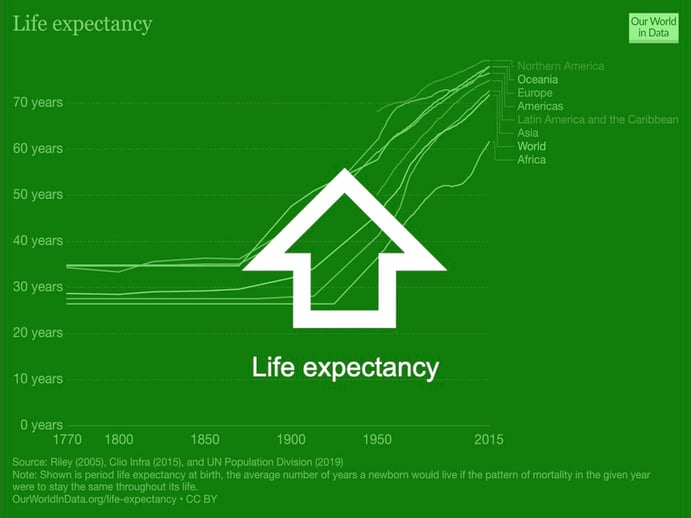
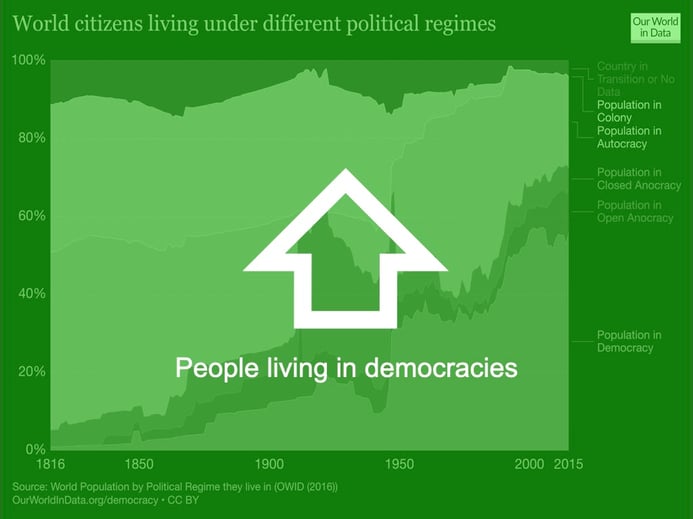
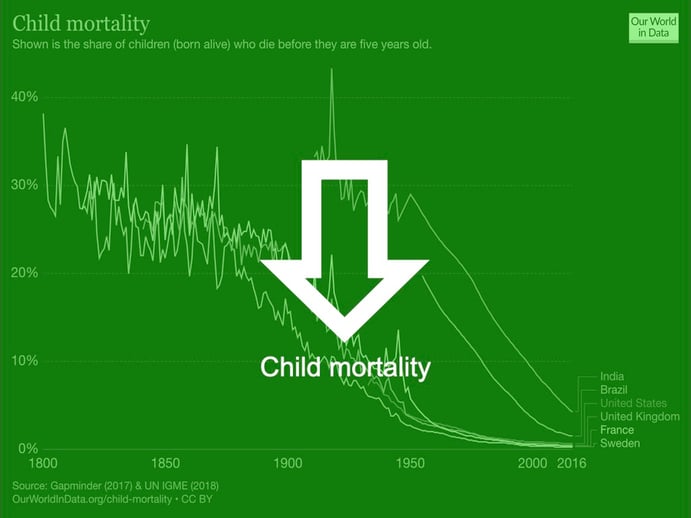
Global income inequality has gone down.“Today, only the very poorest people in the world would die in the way that the richest man of the 19th century died.”[15][16] And, “more than half the world—3.8 billion people—are middle-class or rich.”[17]
Violent crime, divorce and teen pregnancy are all trending down.[18]
And, Child mortality is trending steadily downward.[19]
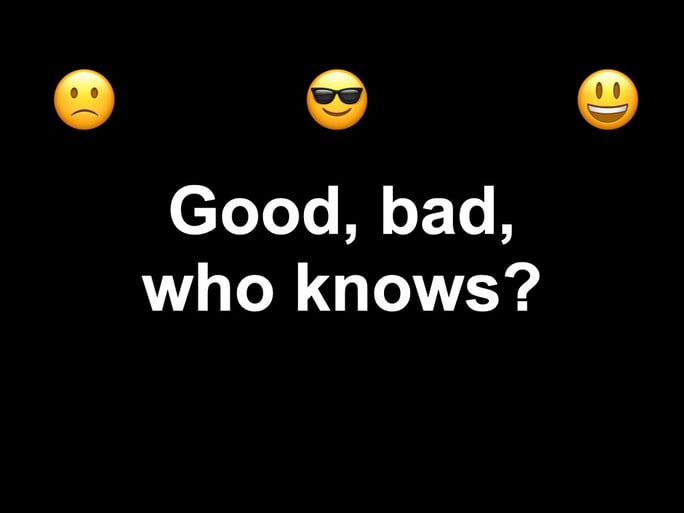
Good, bad, who knows? So, are things bad or good? There is a story of a farmer whose wild stallion ran off one day. All the neighbors gathered around saying “Oh, what bad luck you’ve had.” The farmer said, “bad, good, who knows?” A few days later the stallion returned with a herd of wild horses. The neighbors gathered around saying, “what good luck!” “Bad, good, who knows,” said the farmer. A week later the farmer’s son, while trying to break one of the horses, instead was thrown off the horse and broke his leg. The neighbors gathered and said, “what bad luck you’ve had.” “Bad, good, who knows,” said the farmer. Several weeks later the army came to the town looking for able-bodied youth to join the army and fight. When the soldiers saw the boy’s broken leg, they left him alone and moved on. The neighbors gathered saying, “What good luck you’ve had!” “Bad, good, who knows?”
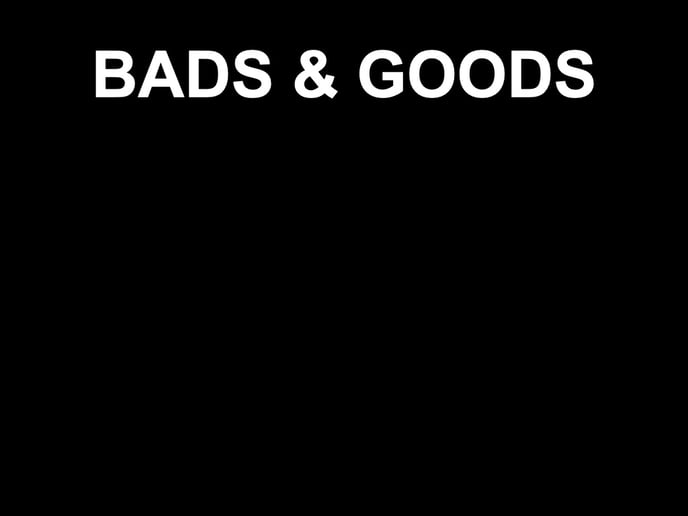
Focus on the Is
Cliches can be useful so remember some of these: Being an optimist and being a pessimist are both biases. While it is sometimes helpful or even necessary to label something as good or bad, Labelling everything with a good and bad labeling gun doesn’t change the facts. “Good, bad, who knows?”
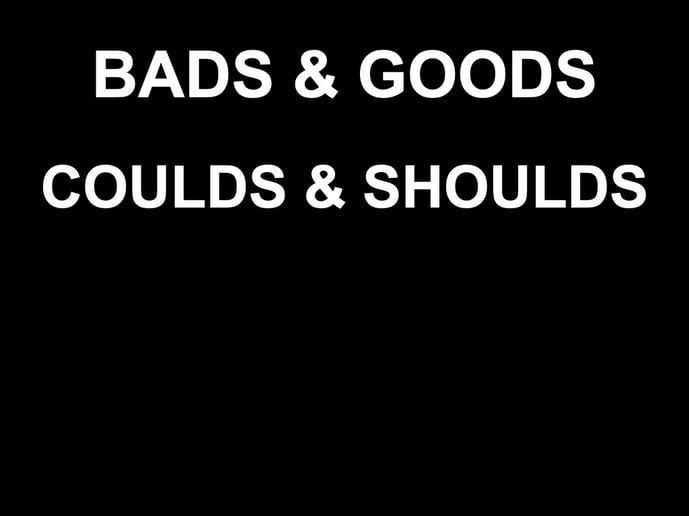
Could be’s and should be’s are also a form of bias. Again, not that we should (no pun intended) never use them, but use them sparingly and be aware when you’re using them. My mother used to say, “Be sure not to should all over everything.”
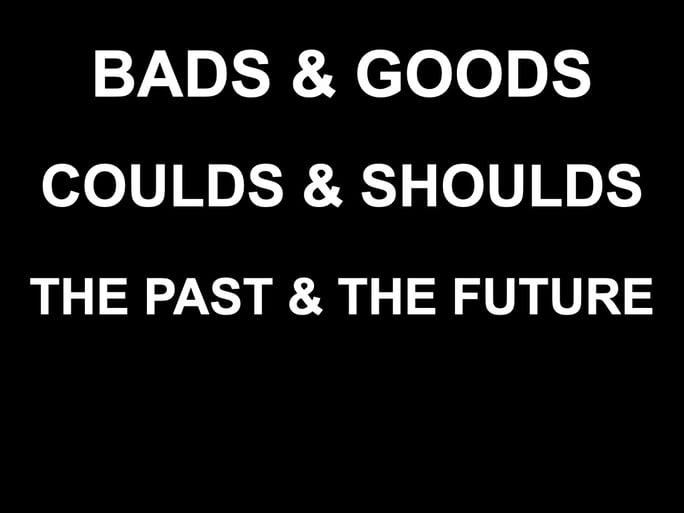
Looking to the future or to the past may also be useful, but what we have is the present. The present is a present. Not in a corny way, but in a way that just is. The present just is. It’s real. We can act in the present. Remember that, “If you have one foot in yesterday and one foot in tomorrow you’re going to piss all over today.”
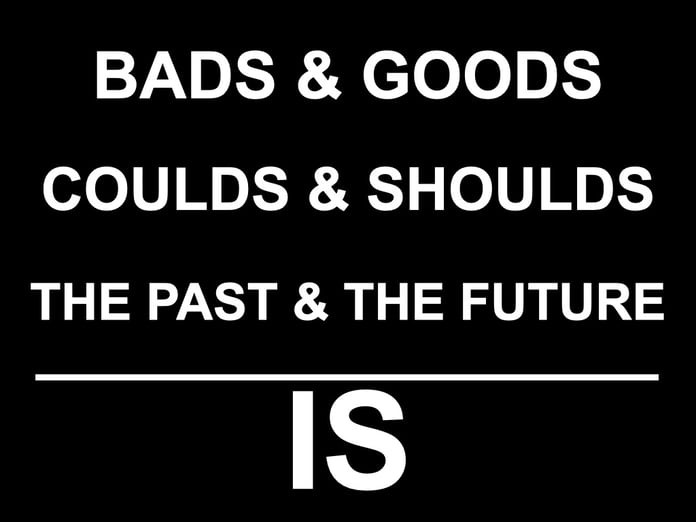
What is, is where the root of the problem lies. Understanding the what is (what we have affectionately called “reality” in this course), is also where the solution will be found. Facts matter. Data matters. The truth matters. What is matters. “The truth will set you free, but first it will piss you off.” So, “don’t shoot the messenger.”
My advice to you, in this regard, is three fold...
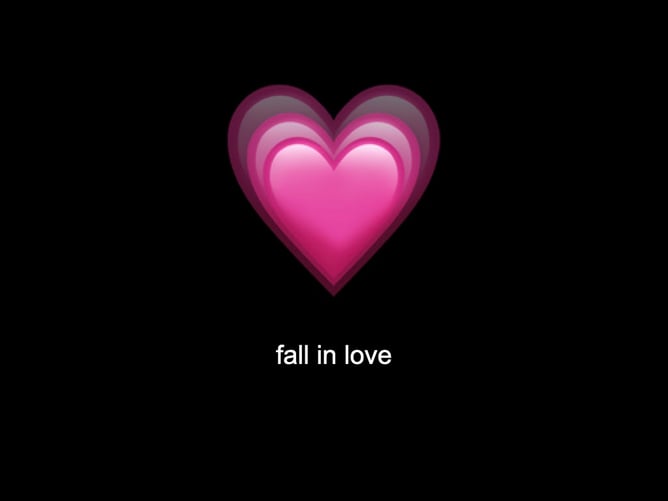
First, Fall in Love with Reality
Fall in love...with Reality. Learn to love hearing it. Learn to love seeing it. Learn to love it. Reality is like a diamond in the rough. Like a prickly old-timer who is yelling at you to get of their lawn but who has a deep and interesting story and a heart of pure gold. Reality is loveable. Learn to be curious about why it is the way it is. Don’t judge it. Just see it as it is.
And see your love of reality for what it really is. A love of survival itself. A love of thriving. Because reality is your best friend. Your most honest friend. The friend that always tells you you have a booger hanging out of your nose, not to embarrass you, but to save you from future embarrassment. Reality wants you to learn. That’s why it is always teaching.
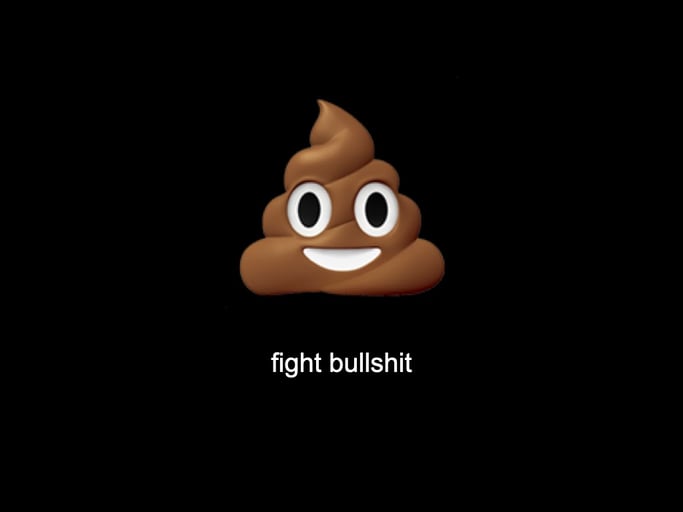
Second, Fight Bullshit. Professor emeritus of philosophy at Princeton University, Harry G. Frankfurt, literally wrote the book, On Bullshit.[20]
In his final farewell, late night comic and satirist, John Stewart, classified bullshit[21] into 2 types: general day-to-day organic free-range bullshit and premeditated, institutional bullshit
Bullshit is everywhere. There is very little that you will encounter in life that has not been, in some way, infused with bullshit; not all of it bad. The general day-to-day organic free-range bullshit is often necessary, or, at the very least, innocuous: "Oh, what a beautiful baby! I'm sure it'll grow into that head!" That kind of bullshit, in many ways, provides important social contract fertilizer, which keeps people from making each other cry all day. But then, there's the more pernicious bullshit; the premeditated, institutional bullshit designed to obscure and distract.”
Don’t merely avoid bullshit, eschew it. Deliberately avoid using it. But, in this day and age, even that’s not enough. You must repel bullshit. You must fight bullshit like we fight terrorism. As Stewart advises, “if you smell something, say something.”
But, in order to fight bullshit, you must detect bullshit. For that, there’s no detector that’s better for the job than metacognition.
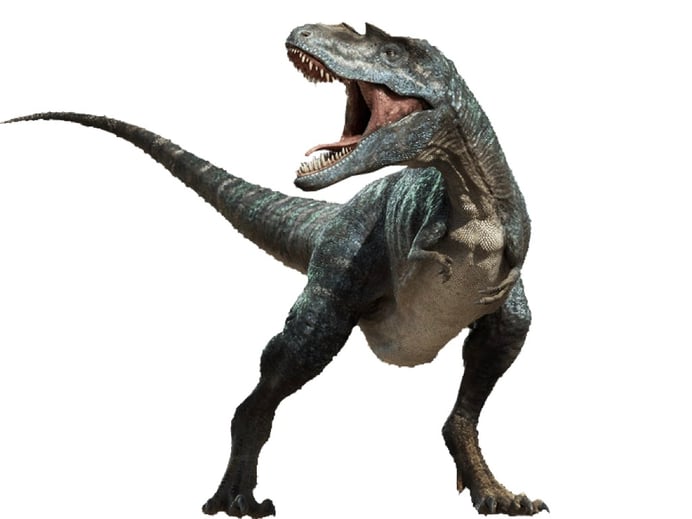
Now, I want to talk about dinosaurs, because dinosaurs are bullshit.
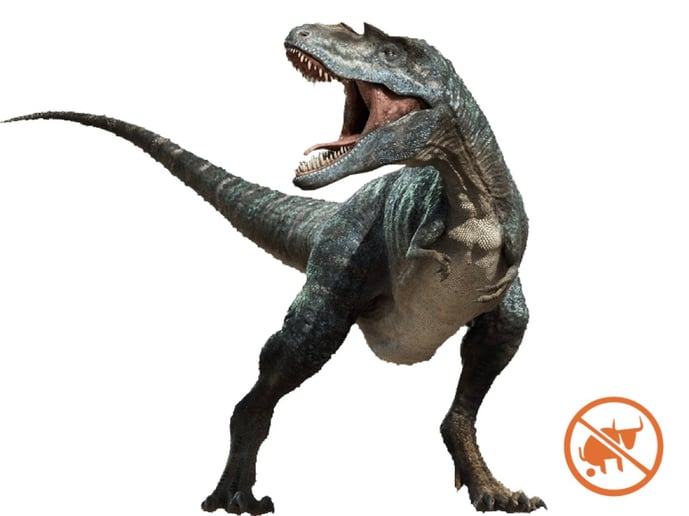
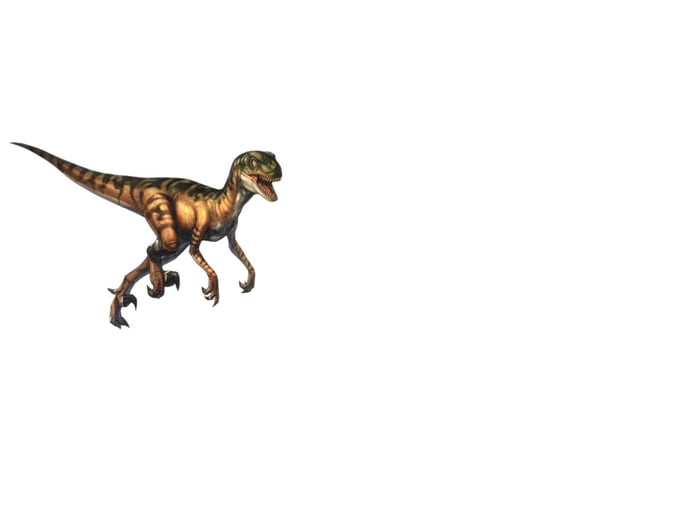
First of all, we think of a Velociraptor as lizard like.
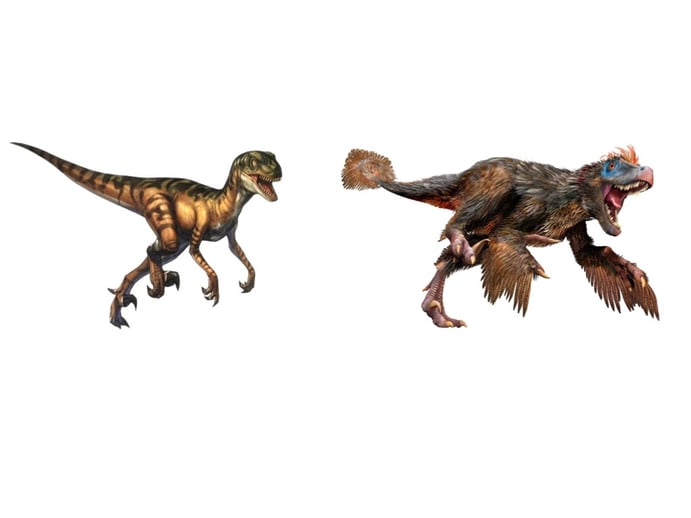
But a forelimb fossil discovered in Mongolia showed quill knobs like those found in many modern birds and that discovery transformed our mental model of Velociraptor mongoliensis into being bird-like with feathers.[22]
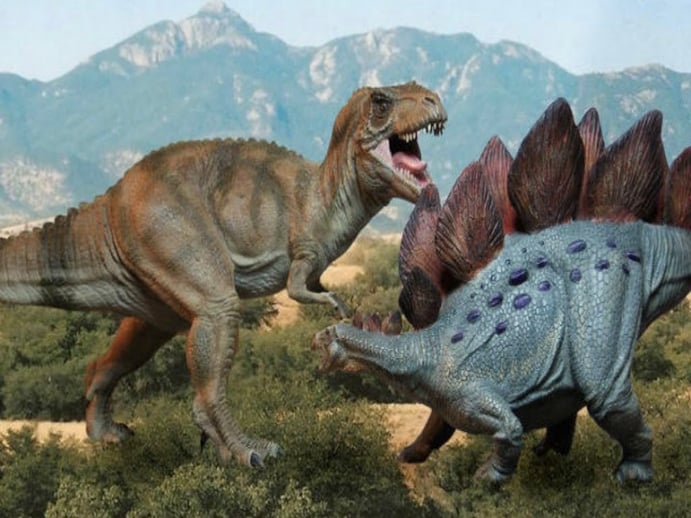
Dinosaurs are amazing because they were huge and fought and…
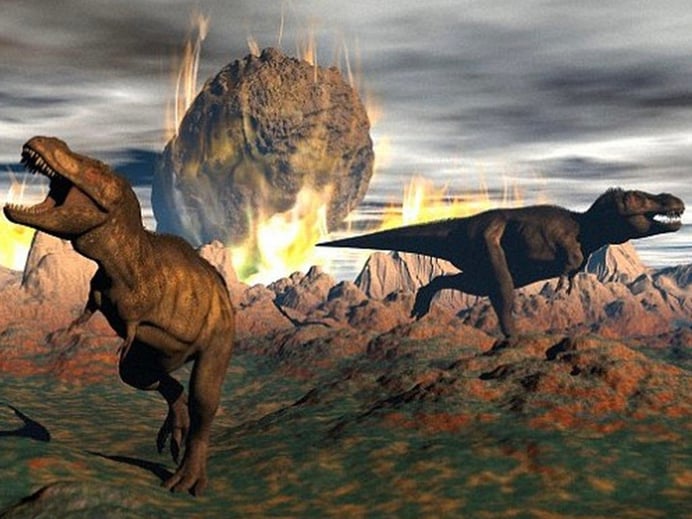
they all got wiped out by an even huger meteor that exploded with the force of 10x the world’s entire nuclear arsenal!
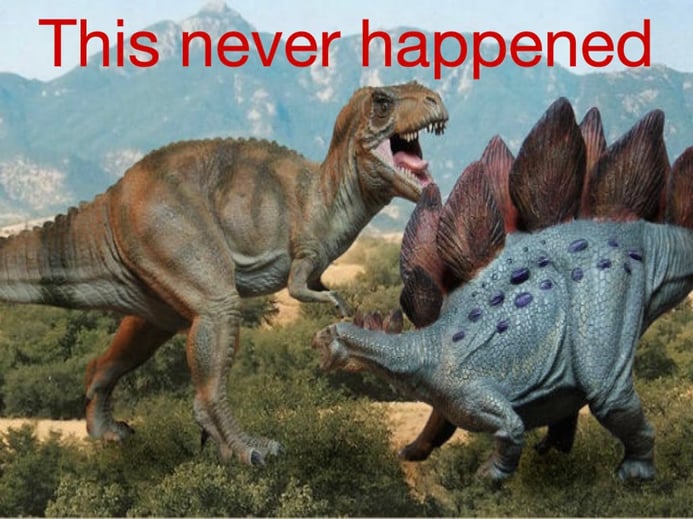
And that… is how fast bullshit can happen! Did you see how I did that? I just spewed a bunch of well worn facts as if they were true. I’m an expert here standing on stage and telling you it's all true.
First, Stegosaurus lived 150 million years ago, while T-Rex lived only 65 million years ago. T-Rex and you are closer together in time than T-Rex and Stegosaurus, so this never happened.
Second, we’re not even sure that it was a meteor that wiped out the dinosaurs. Today, there are two main camps in paleontology: "intrinsic gradualists" and "extrinsic catastrophists.” They have different hypotheses about what happened. Stay tuned. It’s okay to say we don’t know. It’s okay to say, “I don’t know.”
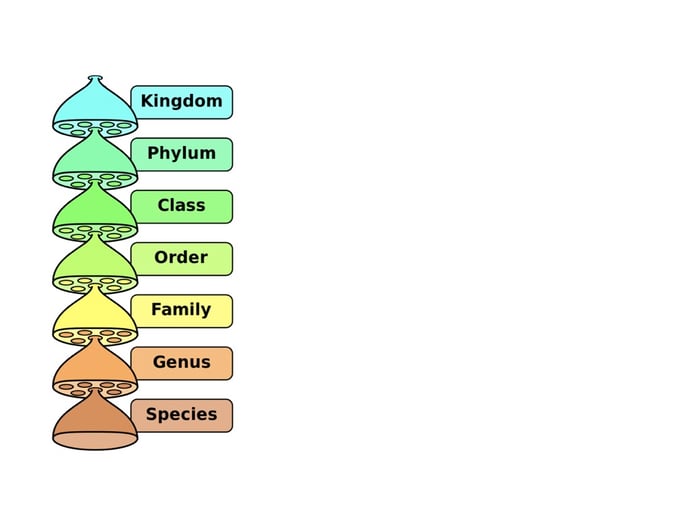
You likely all took a bio course in high school. And, your teacher likely told you that all life on the planet could be organized into a schema called the biological species concept. Your teacher may have also given you a nifty mnemonic device like Kings Play Chess on Fridays Generally Speaking to commit it to memory.
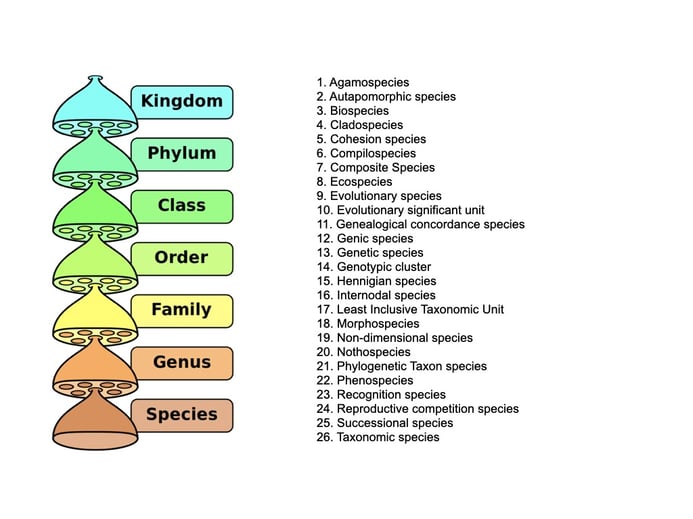
But what they didn’t tell you is that this is some bullshit. One, species aren’t organized this way. We organized them this way. Two, scientists use up to 26 different organizing models of species depending on what they’re trying to figure out—this is just one of those 26. Third, there is reason to believe that the whole “Kingdom metaphor” and “King of the Jungle stuff” is a holdover from when we lived under a monarchy.
So, what is the moral of the story of bullshit?
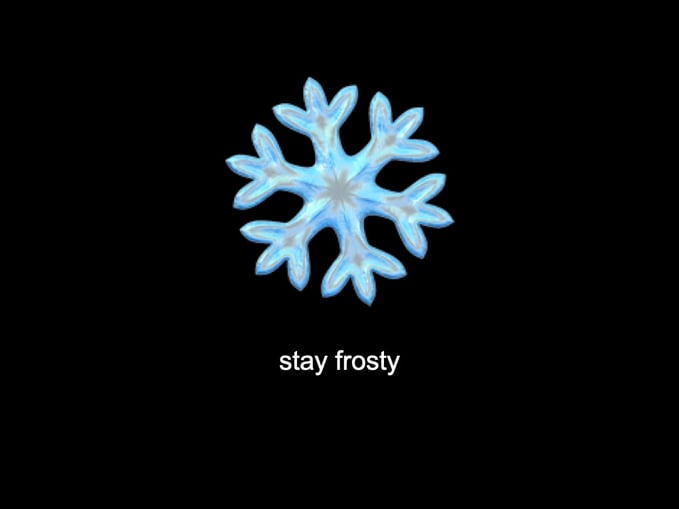
Third, Stay frosty. Because bullshit is all around us.
Now, you’re going to think I mean pay attention to me. But don’t! Don’t pay any attention to me or anyone else. Don’t listen to your professors. Or especially your President. Don’t merely absorb what they say. Pay attention for bullshit.
It is literally all around you. Assume there’s some around and actually look for it! That’s my advice about bullshit. Be on the look out for it.
Some purveyors of bullshit take it to a whole new level: olympic level bullshit.
- a lot of people are saying;
- believe me;
- non sequiturs and red herrings;
- gas lighting;
- complexification;
- vague implications with a raised eyebrow or a shrug;
- ad hominem and straw man attacks; and
- run of the mill lies.
But you need not go to the far end of the bullshit meter to find bullshit. You can find it right in front of you; in your textbooks and in your politicians.
And, literally in you. Remember that you are a purveyor of bullshit, too. And, so are most of your friends. In fact, if I were to summarize the findings of the last 60 years of cognitive and neuro science, I’d summarize it like this: we thought humans were biased and it turns out they are more biased than we thought.
Everyone is full of bullshit and you’ll find bullshit everywhere. But, do remember this: Science is less full of it than anywhere else.
Stay frosty is a term used in the military. It means:
- keep your emotions in check (a source of a lot of bullshit).
- keep your head on a swivel.
- pay f-ing attention.
- stay alert and on one's toes;
- In a word, it means metacognition.
Folks in the military often use the phrase “stay frosty,” followed by “check your six.” This means keep looking behind you, for a counter attack. Your “six o’clock” is your own bias—the bias that is hardest to see. Remember to stay frosty and check your six.
I hope that what you’ve learned in this class is to stay frosty. To count yourself among those that are globally and locally, intrapersonally and interpersonally aware. Not to frame things in terms of good and bad, but in terms of their all important context. And then to peer into that context and see:
- the distinctions that matter
- the systems that matter
- the relationships that matter
- the perspectives that matter and transform
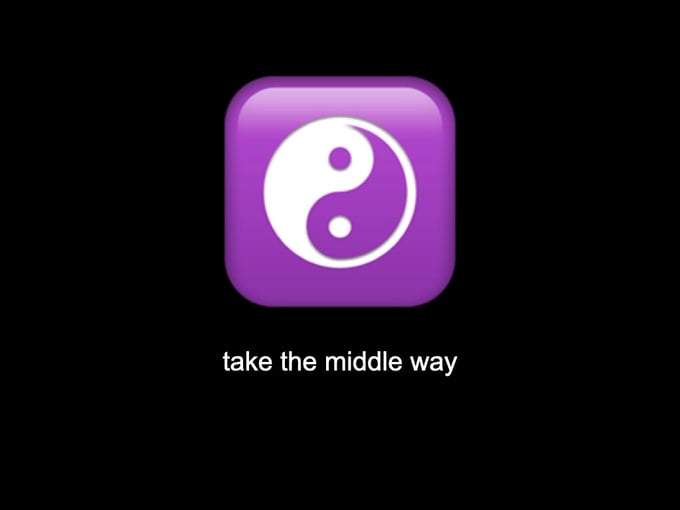
Take the Middle Way. F. Scott Fitzgerald said, “The test of a first-rate intelligence is the ability to hold two opposed ideas in mind at the same time and still retain the ability to function.”
Systems thinking is about seeing the middle way.
- Not reductionist OR Holist but both.
- Not Forest instead of trees but BOTH.
- Not Appolonian OR Dyonysian but BOTH. (Remember you learned this in Ithaca, home of Odysseus, an original middleway thinker)
- Not Republican OR Democrat but BOTH.
It is about reconciling paradoxes and opposites, goods and bads, yins and yangs.

Robert Frost said, “Three roads diverged in a wood, and I— I took the middle way. And that has made all the difference.”
I lied. Robert frost didn’t say that. There was only two. And that’s the point. People always give you two options, even the woods only give you two options. But there is the middle option. Go that way.
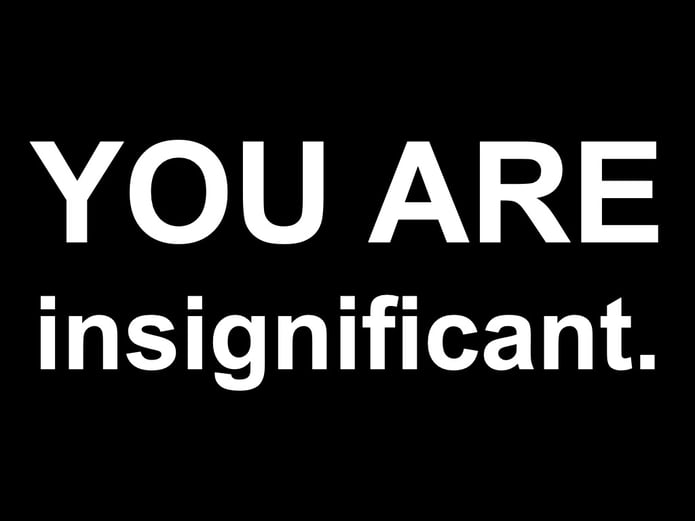
You are insignificant. It’s true. You and your life are insignificant. I want to make sure you know this, empirically. Let’s take a look at just how insignificant you are.
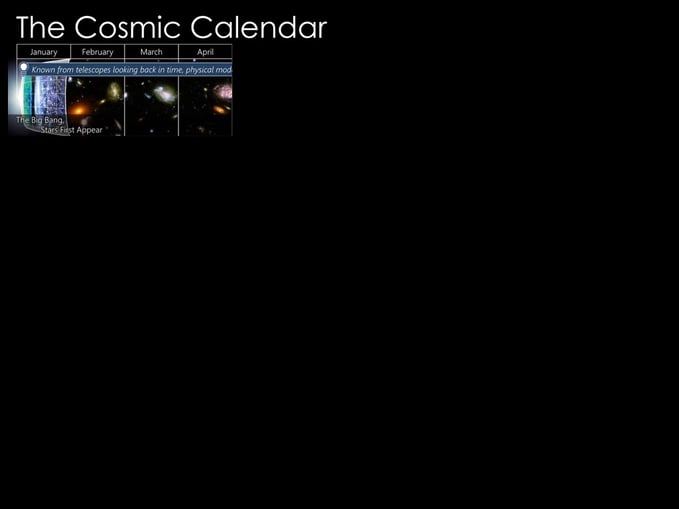
The Cosmic Calendar compresses the Earth’s 13.8B year history into a single calendar year
Here’s what happened in the first four months after the Big Bang on January 1st.
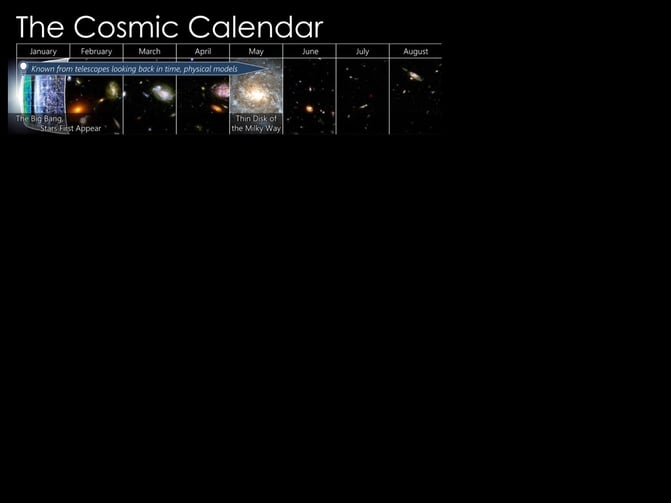
The next four months saw the forming of the Milky Way.
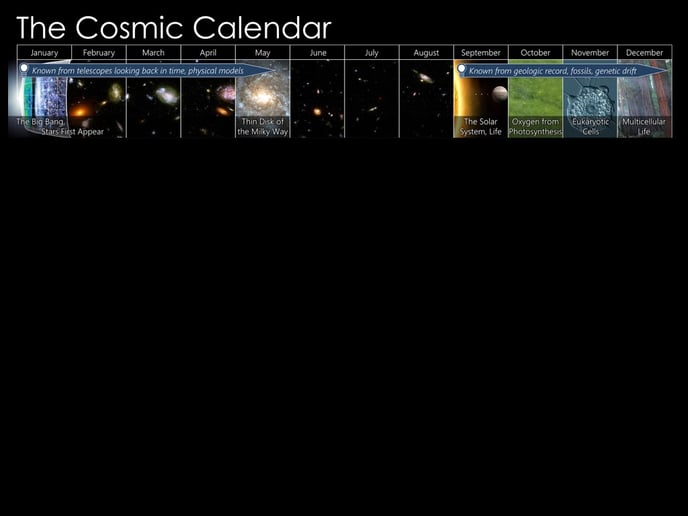
And the final four months saw our Solar System form and Life within take shape.
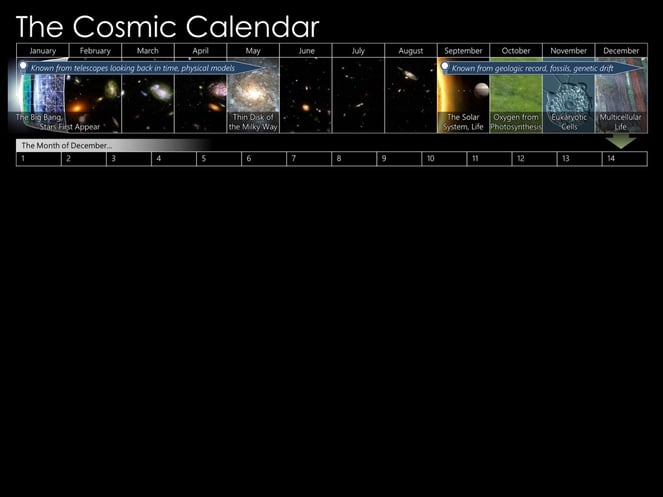
But let’s break down this final month (December). In the first 14 days multicellular life began.
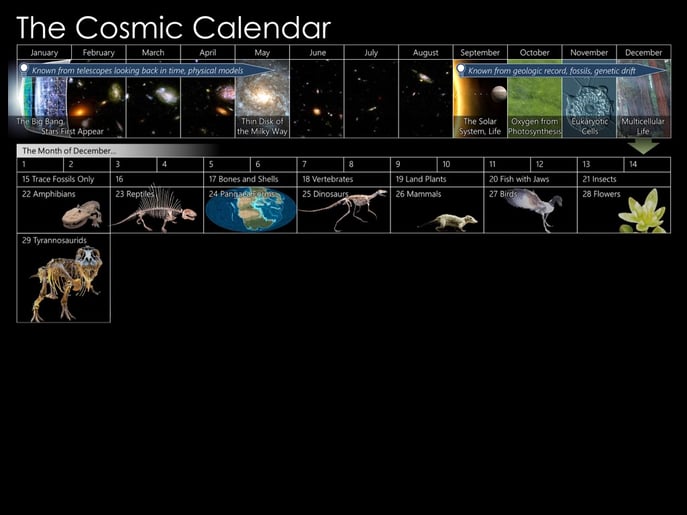
Between December 15 and 29 we saw a number of other species originate and flourish.
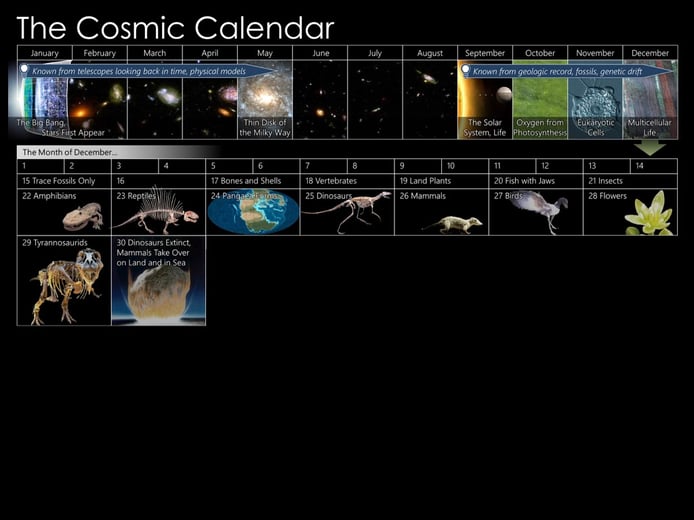
On December 30th, the KT explosion, and dinos went extinct.
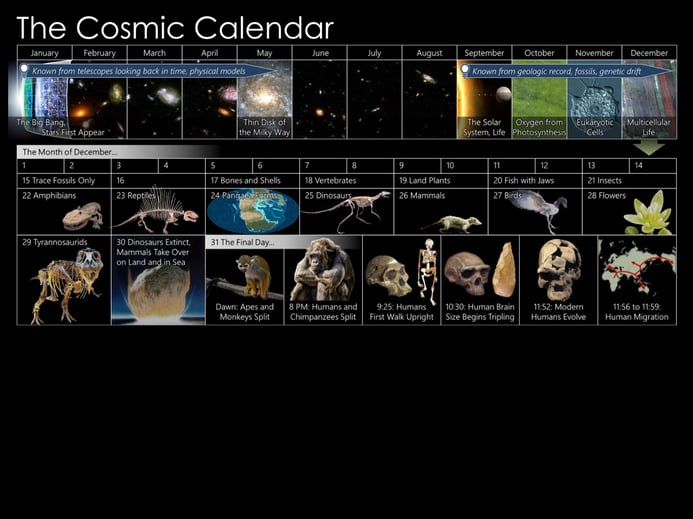
Dec 31st—the last day of the year—was a particularly important day for us as that was the dawn of the apes and hominids.
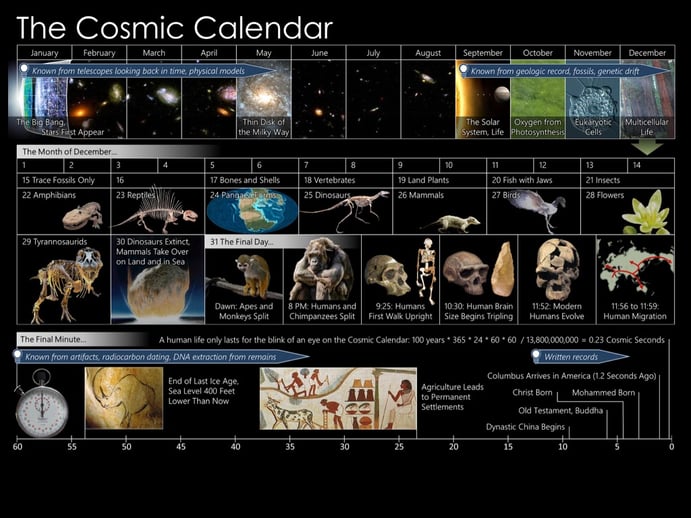
In particular, at around 8PM on the 31st—just four hours before midnight (present)—humans and chimpanzees split in the evolutionary tree.
At 9:25PM, the first walking humans.
All of human “modern and pre modern history” occurs in the last 60 seconds of the year. China begins with 10 seconds left in the year. Christ and Mohammed are born between 6 and 3 seconds before the year ends. Columbus arrives in the Americas 1 second before midnight.
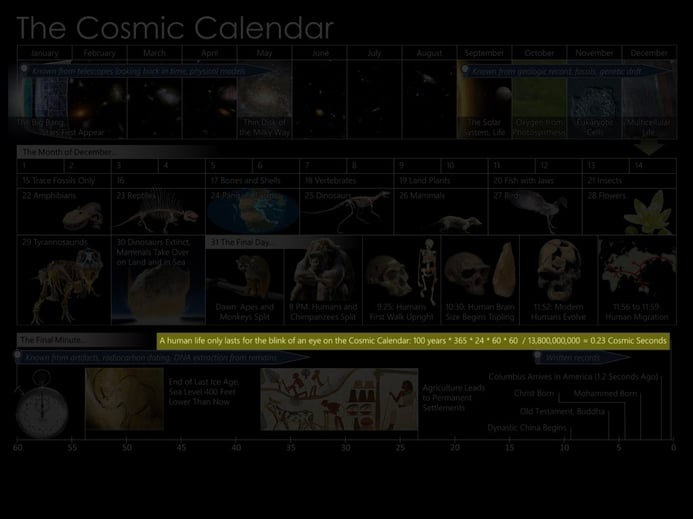
Now, let’s zoom in on this little factoid, “A human life only lasts the blink of an eye on the Cosmic Calendar: 100 years * 365 days * 24 * 60 * 60 / 123,800,000,000 = 0.23 Cosmic Seconds. A human life span.
They’re being generous giving 100 years. The average human lifespan today is...
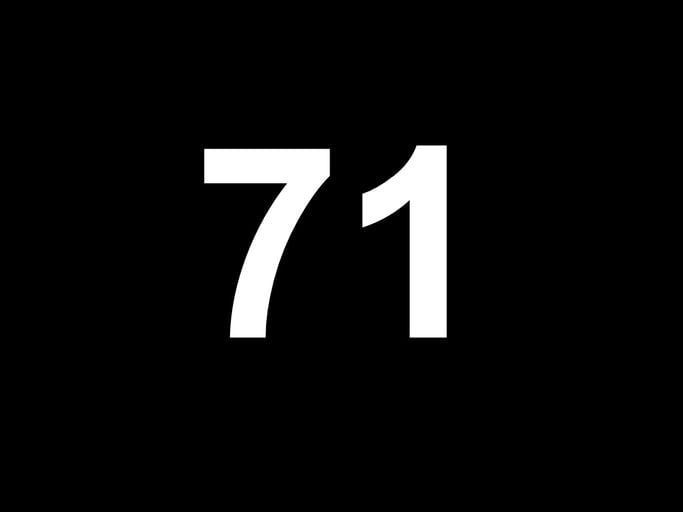
In human time scale, a human life is on average, today, 71 years.

71 years is 25,915 sunrises in a life. (I try to be awake for all of them).

That means that if things work out as average, I have 7,665 sunrises left in my life. Now, if you’re thirty or so, then...

14,965 is the number of sunrises you have left in your life. That means you’re over half way done.
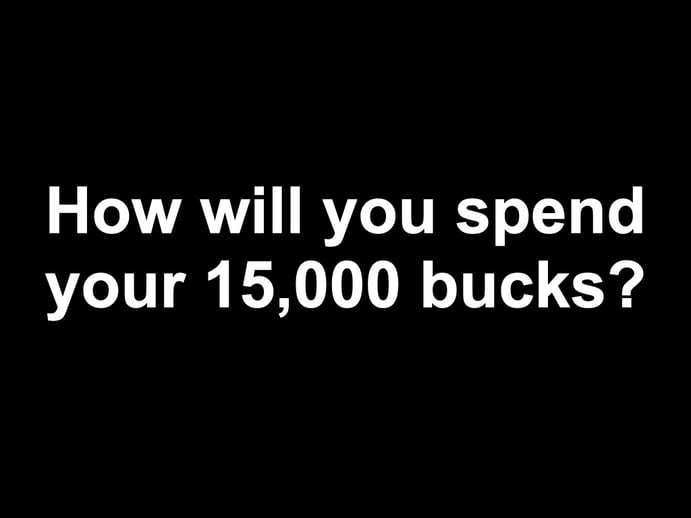
So, I want to ask you something. If you knew you only had $15,000 bucks to last you the entire rest of your life. How would you spend one dollar? Have fun. Wake up early. Be present for every one of those sunrises. Make the most of it. You’re insignificant. Your problems are insignificant.
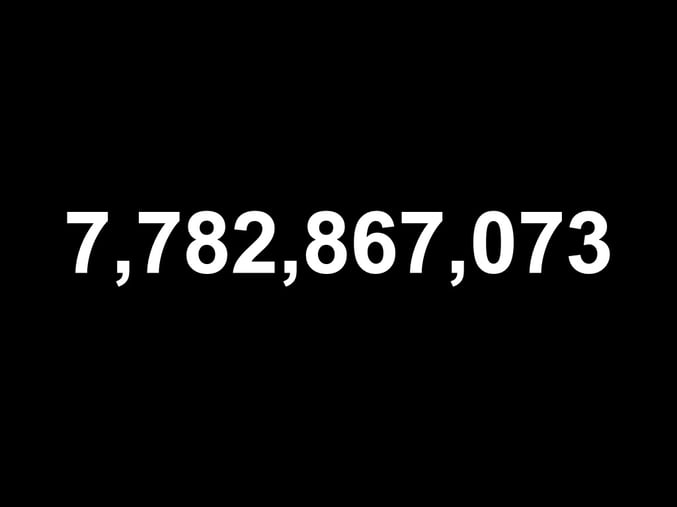
7,782,867,073. Here’s another number. That’s how many people are in the world as of this morning’s sunrise.
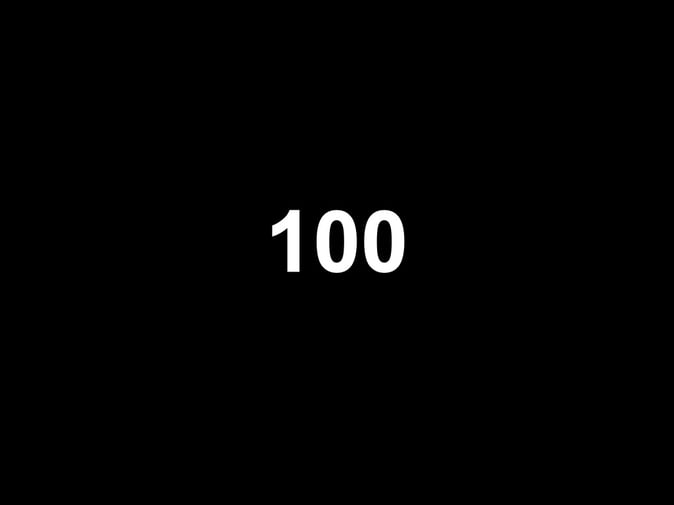
But, I want to share with you a few more numbers. What if the world today were 100 people?
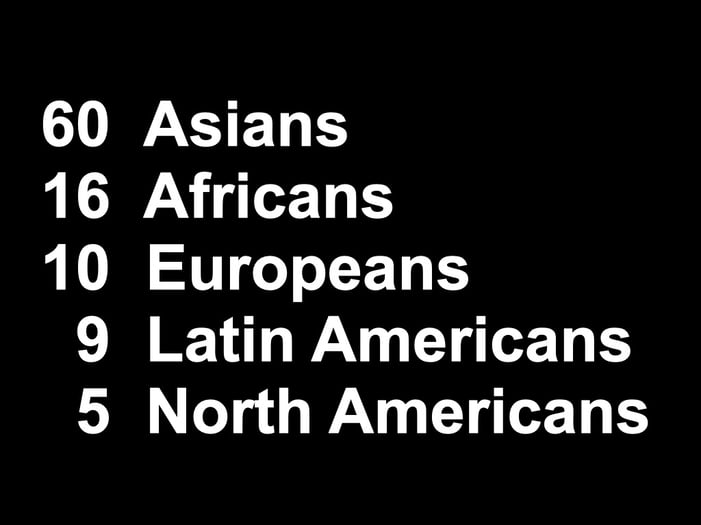
If the world were 100 people…
60 Asians
16 Africans
10 Europeans
9 Latin Americans
5 North Americans
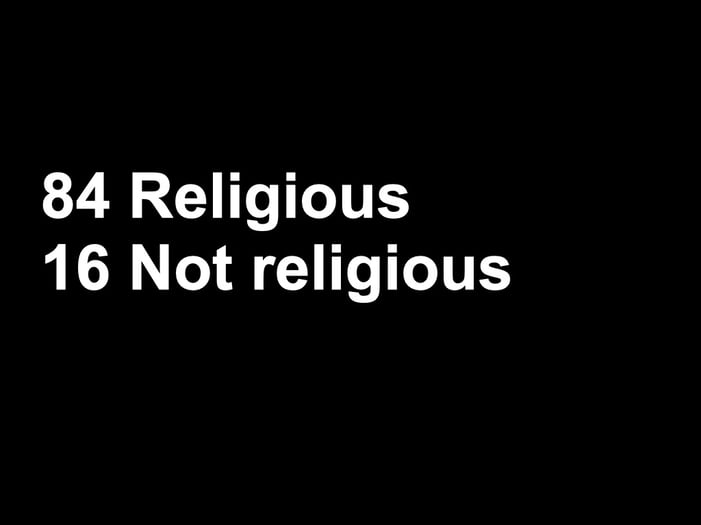
If the world were 100 people…
84 Religious (31 Christian, 23 Muslim, 15 Hindu, 7 Buddhist, 8 other)
16 Not religious
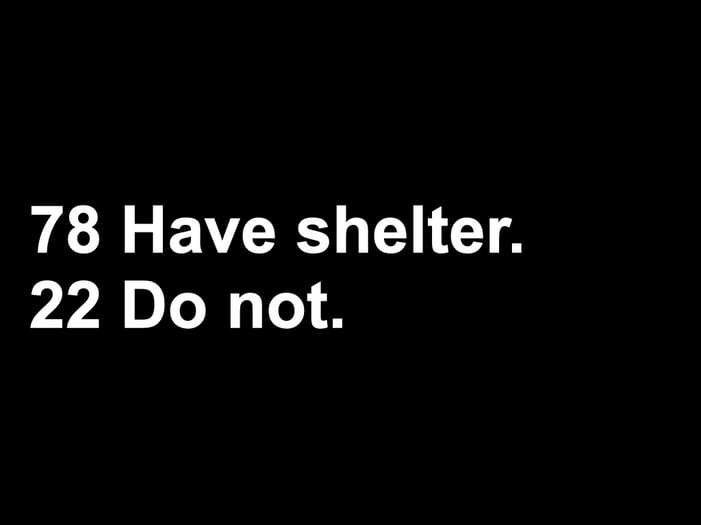
If the world were 100 people…
78 Have shelter.
22 Do not.
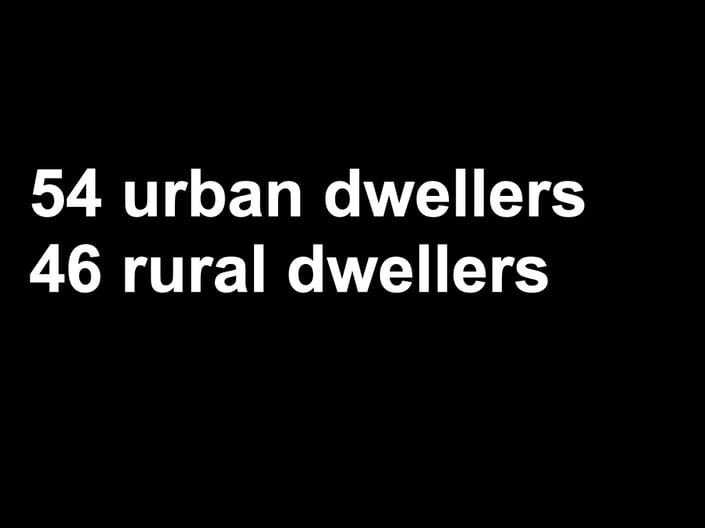
If the world were 100 people...
54 would be urban dwellers
46 would be rural dwellers
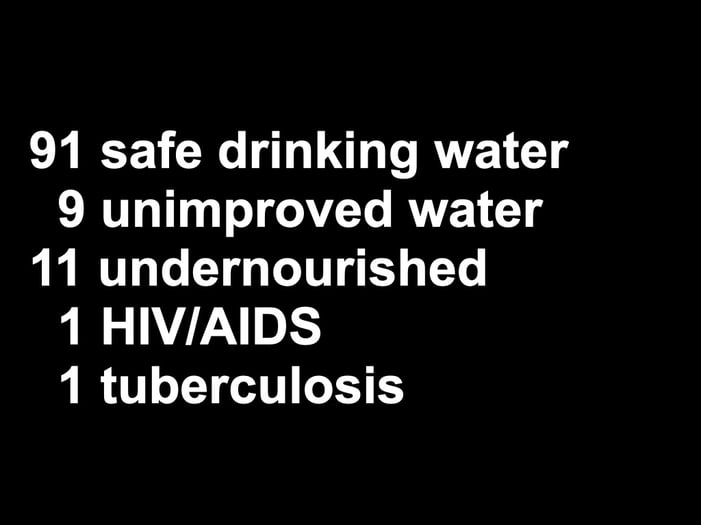
If the world were 100 people...
91 safe drinking water
9 unimproved water
11 undernourished
1 HIV/AIDS
1 tuberculosis
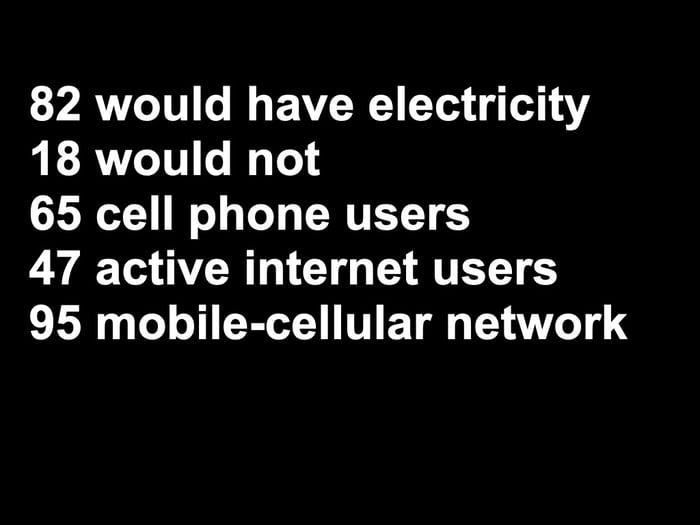
If the world were 100 people...
82 would have electricity
18 would not
65 cell phone users
47 active internet users
95 mobile-cellular network
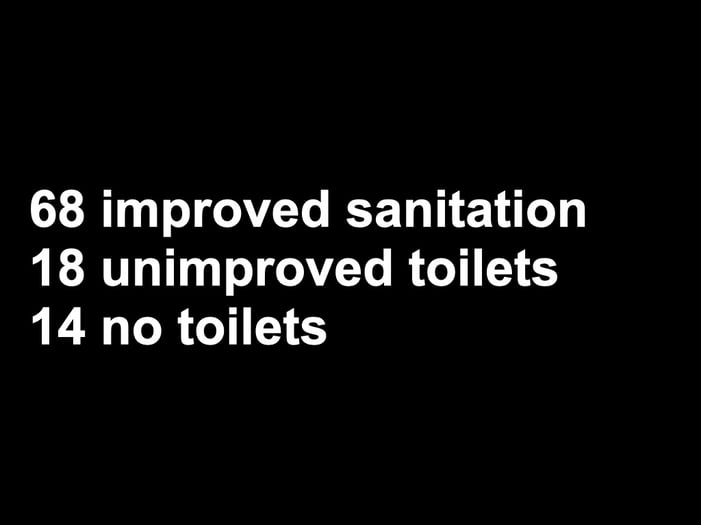
If the world were 100 people...
68 would have improved sanitation
14 would have no toilets
18 would have unimproved toilets
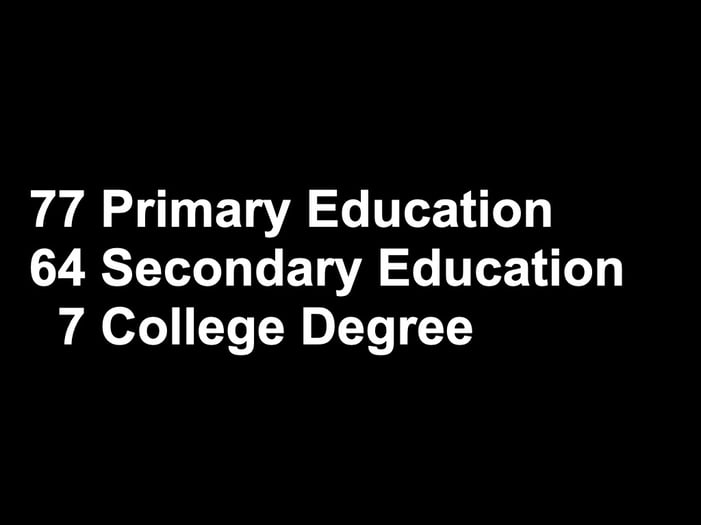
If the world were 100 people...
77 Primary Education
64 Secondary Education
7 College Degree*
*In 2006, only 1 person out of 100 would have had a college education-- today that number has jumped to 7.
So, what do all these numbers mean?
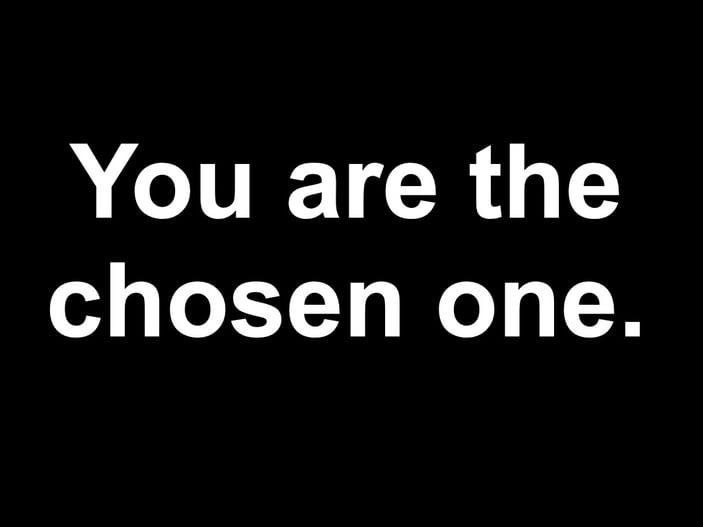
You are the chosen one. I mentioned earlier, that you and your life are insignificant. And yet, you are the chosen one.
The language of nature isn’t math—although math is a uniquely remarkable language—the language of nature is paradox. Nature has had a long time to reconcile paradoxes. So, yes, your life is insignificant. And, you are the chosen one.
I want to make sure you know this, too.
If not you? Who? You are part of the .001% (the .0001 that has an advanced degree from an Ivy League University).
In fact, even without the Ivy League, if you have shelter, enough food to eat, a computer, potable water, electricity, a computer, a degree, a graduate degree, you are part of the 1%.
You’re not in the 1% because of your smarts, good nature, or good looks. You’re in the 1% because you got lucky and because the world is unfair. You got good parents, or a good break, or whatever it is that brought you to the 1%. You might think that it was your hard work and determination that got you there, but where did you get those qualities from? No matter how far back you draw the chain of causality, the truth will be evident: the world is unfair, and you just got lucky. You are the chosen one.
And, because much has been given to you, much is expected of you.
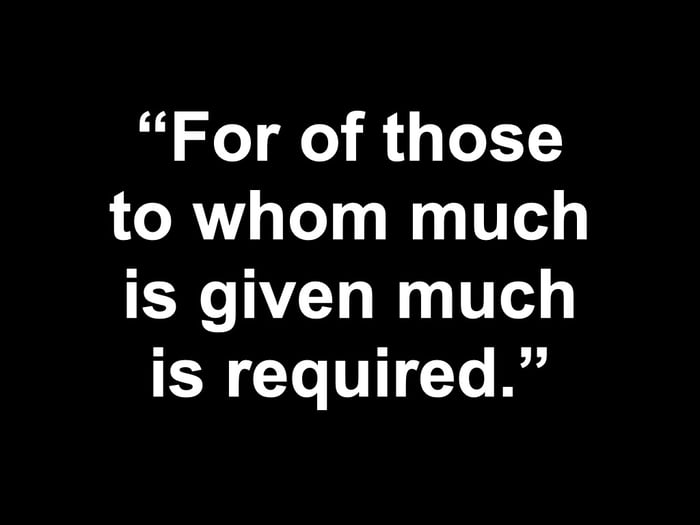
Etched on my immigrant father’s gravestone is a quote from American President John F. Kennedy. A quote my father said to us kids all too often: “For of those to whom much is given much is required.”
You might say to yourself, “How could I—little old insignificant me—change the world? For that, I have a story for you about idolizing authority figures and playing small yourself.

The Emperor. In hans Christian Andersen’s children’ story, “The Emperor's New Clothes, a vain emperor is conned by two weavers he hires to make him new clothes. So that they don’t actually have to make any clothes, the weavers convince the Emperor that the fabric they use is so fine that it is invisible to those unfit to their position. Although noone can see the clothes because they do not exist, the Emperor's ministers all pretend to see them lest they be deemed unworthy to their positions. The weavers bring the Emperor his “finished” garments and mime putting them on him. The Emperor then marches in a parade to show off his new robes and everyone plays along with the pretense.

A single child blurts out from the crowd, “The emperor has no clothes!” The crowd takes up the cry, but the Emperor continues on with the pretense even though he recognizes that what the child said is true.
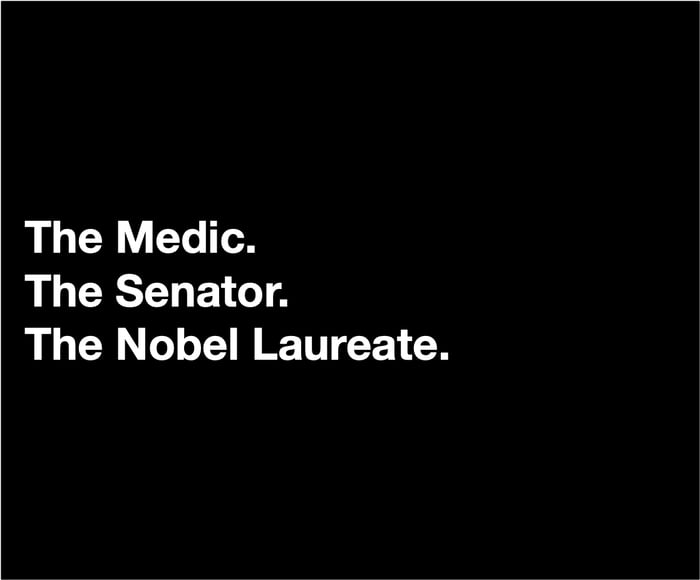
A Medic, a Senator, and a Nobel Laureate, walk into a Bar
This might be an intro to a joke. But it is actually four vignettes from my life, the shortened versions of which I’d like to share with you.
As a high school flunkout, I started adulthood with not too much confidence in my smarts or academic prowess. I certainly never dreamed I’d end up at Cornell or be a scientist or systems theorist!
But along the way I had 4 prominent “Emperor has no clothes” moments that gave me the confidence that I wasn’t an imposter and that I had something to say and to contribute.
The first, was when I trained to be a medic on an ambulance. I thought medics were pretty legendary and so as a young man I dreamed of becoming one. I wasn’t sure at the time if I could pass the test and become certified. But I did! My first shift on the ambulance my “lead” was a seasoned veteran who had been doing it for years. He was a complete boob who didn’t know an IV from a catheter. I was shocked and remember thinking, “how is this possible?”
Fast forward many years and I had the privilege of meeting a world-famous physicist. I wanted to download his entire brain to understand the deep wisdom that he had gleaned from such a basal understanding of the universe. What I learned is that he was a self-centered, angry, psycho-socially inept, man-baby who had eschewed his own family and come to the end of his life alone. “How could someone I thought to be so wise be so clueless to any learnings outside of his domain? How is this possible?”
Some years later I was invited to give a big talk. It was the first talk I had given where there was a legitimate “green room” with hors devours and swanky seating. I was joined by another speaker who was a US Senator. I remember thinking, “I am so far out of my depth.” But then he started talking to me as if I was his fraternity bro and revealed that he was a small-thinking, chauvinistic, elitist, self-serving, douche bag. Again, I was shocked, “How could a man make it to the status of a US Senator and be so sophomoric?” I remember thinking, “How is this possible?”
In each case it was possible because it is often the case that the emperor has no clothes. Of course, over the years I have met hundreds of incredibly ethical, competent, remarkable people, too. But, just because someone is in large or in charge doesn’t mean that they are, as my mother would say, “all that and a bag of nuts.”
I don’t know why I’ve had to learn this lesson so many times. But, reality keeps teaching it to me. Respect authority if their behavior warrants respect. Otherwise, make your own way. Don’t look for their approval to make change in the world. If not you, who?
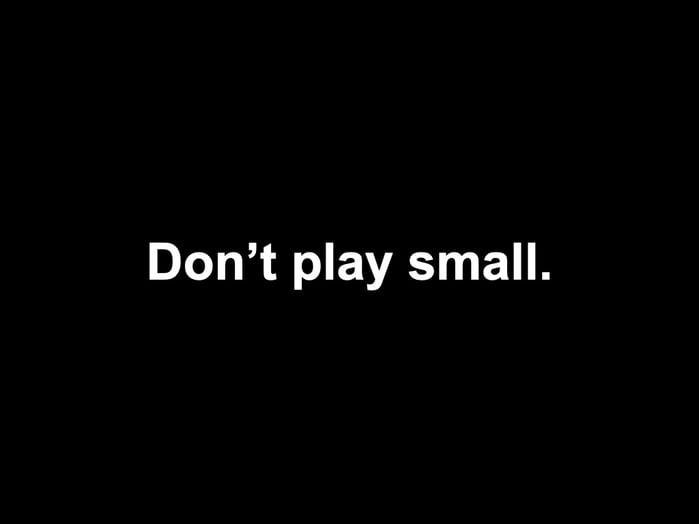
Playing Small. There are all kinds of reasons we undermine ourselves and overestimate others. As inoculation against this subversive practice, I give you two ideas, both of which I borrow from others wiser than me.
Marianne Williamson said it better than I ever could,
“Our deepest fear is not that we are inadequate. Our deepest fear is that we are powerful beyond measure. It is our light, not our darkness that most frightens us. We ask ourselves, 'Who am I to be brilliant, gorgeous, talented, fabulous?' Actually, who are you not to be? Your playing small does not serve the world. There is nothing enlightened about shrinking so that other people won't feel insecure around you...And as we let our own light shine, we unconsciously give other people permission to do the same. As we are liberated from our own fear, our presence automatically liberates others.”
And Mother Teresa, too. She said:
- “People are often unreasonable, irrational, and self-centered. Forgive them anyway.
- If you are kind, people may accuse you of selfish, ulterior motives. Be kind anyway.
- If you are successful, you will win some unfaithful friends and some genuine enemies. Succeed anyway.
- If you are honest and sincere people may deceive you. Be honest and sincere anyway.
- What you spend years creating, others could destroy overnight. Create anyway.
- If you find serenity and happiness, some may be jealous. Be happy anyway.
- The good you do today, will often be forgotten. Do good anyway.
- Give the best you have, and it will never be enough. Give your best anyway.
- In the final analysis, It was never between you and them anyway.”

The constitution of the US starts with its most popular line, “We the people” of the united states.
That usually gets the most attention; and for good reason. We the people.

But my favorite part of the constitution, as a systems thinker is the next bit….
“in order to form a more perfect union,”
The point is that things are never going to be perfect, but they can be more perfect. Don’t let perfection be the enemy of greatness. Our job is not to sit in judgment and then exit, nor to get down on ourselves when we do not live up to our most espoused values. Our job is to form a more perfect union. To always strive to get more feedback, to learn more, to adapt more, to make things more better. Not perfect. More perfect.
So my final parting advice to you is this...
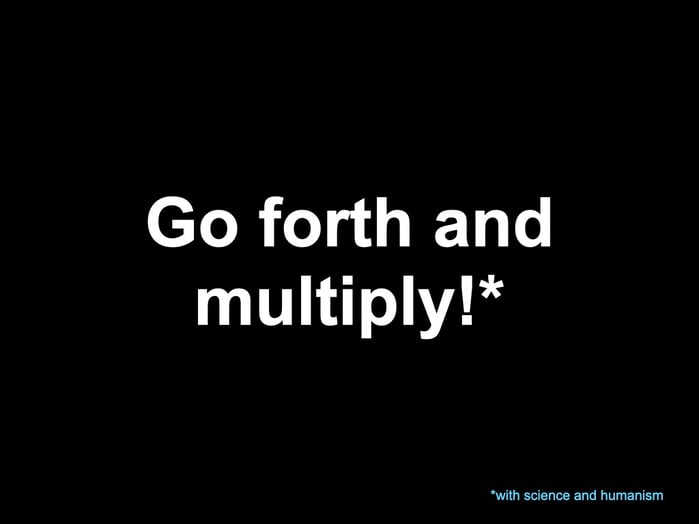
Go forth and multiply!*
So what am I asking you to do. Go forth and multiply my friends. Of course, I don’t mean have lots of children, although you should definitely have children. They’re the best thing you’ll ever do. What I mean is go forth and multiply your good effect on the world.
Pervasively, grittfully, purposefully, formally, impatiently, addictively, Go forth.
To impact this world positively--to multiply yourself--you’ll need to find your special purpose! Find a purpose that hits your sweet spot between what:
- you are passionate about
- you are good at
- you can get paid for (that one is for your parents)
- and most of all, that the world needs.
Don’t try to find and execute your purpose. Yoda said, there is no try. Find it and execute it. If you don’t know what your purpose is yet, make it your purpose to find your purpose.
And, when you meet with obstacles, do it anyway.
When you meet with obstacles remember Randy Pausch’s advice that the obstacles are there to show you how bad you want it.
When these obstacles lay your sundry weaknesses bare for the world to see, answer them by transforming your weaknesses into your strengths.
But, go forth with two dispositions that I hope were reinforced in this course. Go forth with science and humanism.
- Go forth with science: Observe the world and test against reality with reason, facts, and evidence over superstition, religiosity, authority, myth, innuendo, charisma, and gut feelings;
- Go forth with humanism: An ethic that we can form a more perfect union. A more perfect world.
And goddamn it, go make the world a better place than you found it.
References
[1] Kornowski, Liat. “13 Incredible Facts You NEED To Know About The Environment.” HuffPost, HuffPost, 24 Nov. 2013, www.huffpost.com/entry/environment-facts_n_4318799.
[2] “EarthEcho International.” EarthEcho International | #DYK? Some Interesting Facts about the Environment, EarthEcho, earthecho.org/
[3] EarthEcho International.” EarthEcho International | #DYK? Some Interesting Facts about the Environment, EarthEcho, earthecho.org/
[4] “In 2018, 16.2% of all children (11.9 million kids) lived in Poverty USA—that’s almost 1 in every 6 children.” “The Population of Poverty USA.” Poverty USA, Poverty USA, 2019, www.povertyusa.org/facts.
[5]https://www.washingtonpost.com/politics/2020/04/14/president-trump-made-18000-false-or-misleading-claims-1170-days/
[6] Thomas, Scot. “Addiction Statistics: Drug & Substance Abuse Statistics.” American Addiction Centers, American Addiction Centers, 11 Nov. 2019, americanaddictioncenters.org/rehab-guide/addiction-statistics.
[7] Each year, 1.4 million people worldwide lose their lives to violence. “10 Facts about Violence Prevention.” World Health Organization, World Health Organization, 26 May 2017, www.who.int/features/factfiles/violence/en/.
[8] Martin , Micheal, and Steven Pinker. “Despite The Headlines, Steven Pinker Says The World Is Becoming Less Violent.” Special Series: The Impact Of War , NPR, 16 July 2016, www.npr.org/2016/07/16/486311030/despite-the-headlines-steven-pinker-says-the-world-is-becoming-less-violent.
[9] Martin , Micheal, and Steven Pinker. “Despite The Headlines, Steven Pinker Says The World Is Becoming Less Violent.” Special Series: The Impact Of War , NPR, 16 July 2016, www.npr.org/2016/07/16/486311030/despite-the-headlines-steven-pinker-says-the-world-is-becoming-less-violent.
[10] Stetka, Bret. “Steven Pinker: This Is History's Most Peaceful Time--New Study: ‘Not So Fast.’” Scientific American, Scientific American, 9 Nov. 2017, www.scientificamerican.com/article/steven-pinker-this-is-historys-most-peaceful-time-new-study-not-so-fast/.
[11] Stetka, Bret. “Steven Pinker: This Is History's Most Peaceful Time--New Study: ‘Not So Fast.’” Scientific American, Scientific American, 9 Nov. 2017, www.scientificamerican.com/article/steven-pinker-this-is-historys-most-peaceful-time-new-study-not-so-fast/.
[12] Probst, Julius. “Seven Reasons Why the World Is Improving.” BBC Future, BBC, 11 Jan. 2019, www.bbc.com/future/article/20190111-seven-reasons-why-the-world-is-improving.
[13] Probst, Julius. “Seven Reasons Why the World Is Improving.” BBC Future, BBC, 11 Jan. 2019, www.bbc.com/future/article/20190111-seven-reasons-why-the-world-is-improving.
[14] Probst, Julius. “Seven Reasons Why the World Is Improving.” BBC Future, BBC, 11 Jan. 2019, www.bbc.com/future/article/20190111-seven-reasons-why-the-world-is-improving.
[15] Ip, Greg. “The World Is Getting Quietly, Relentlessly Better.” The Wall Street Journal, Dow Jones & Company, 2 Jan. 2019, www.wsj.com/articles/the-world-is-getting-quietly-relentlessly-better-11546430400.
[16] Ip, Greg. “The World Is Getting Quietly, Relentlessly Better.” The Wall Street Journal, Dow Jones & Company, 2 Jan. 2019, www.wsj.com/articles/the-world-is-getting-quietly-relentlessly-better-11546430400.
[17] Homi Kharas of the Brookings Institution and Kristofer Hamel of World Data Lab
[18] Ip, Greg. “The World Is Getting Quietly, Relentlessly Better.” The Wall Street Journal, Dow Jones & Company, 2 Jan. 2019, www.wsj.com/articles/the-world-is-getting-quietly-relentlessly-better-11546430400.
[19] Gapminder (2017) & UN IGME (2018) Ourworldindata.org/child-mortality
[20] "On Bullshit" (2005), by Harry G. Frankfurt.
[21] https://time.com/3988497/jon-stewart-daily-show-finale-rant-bullshit/
[22] https://www.sciencedaily.com/releases/2007/09/070920145402.htm





